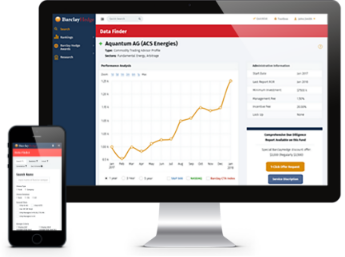Fewer than half of hedge fund managers currently consider environmental, social and governance (ESG) factors when selecting equity securities for their portfolios. But, of those that do take ESG into account, ESG ratings factored in the inclusion of more than half the assets currently in their portfolios.
The significant role ESG ratings play in a significant number of investment decisions is the key takeaway from the latest Barclay Hedge Fund Manager Survey, a quarterly report on the sentiments of professionals in the alternative investments sector.
Other significant findings include:
- Hedge Fund Managers who consider ESG factors in their investments will allocate well over half their assets next year based on ESG rankings.
- Most managers using ESG ratings do so to screen candidates for both Long and Short positions.
- Governance is the factor weighed most heavily by those managers using ESG scores.
- On average, managers considering ESG factors in their investments have been doing so for nearly six years.
Here are the survey’s detailed findings about hedge fund managers’ consideration of ESG factors:
Q1: Do you currently take ESG factors into consideration when selecting equity securities for portfolio inclusion?
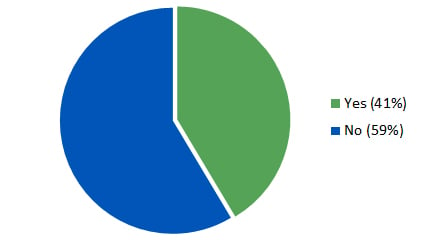
Q2: How long have you been taking ESG factors into consideration when making an investment?
On average, managers considering ESG factors in equity investment decisions have been doing so for 57 months. Survey respondents included managers who’ve just begun considering ESG factors to many who’ve applied them to investment decisions for more than eight years.
While the concept of “socially responsible investment” has a longer history, the introduction of considering more specific environmental, social and governance factors in investment decisions dates to the early 2000s.
Q3: What percent of your assets are currently allocated based on ESG ratings?
Of those considering ESG factors in equity investment decisions, on average 52% of assets are currently allocated based on ESG ratings. Among those surveyed, 41% of respondents indicated that ESG ratings factored into 100% of their asset allocations.
While several of those who indicated ESG ratings factored in 100% of their allocations are also among those who’ve been considering ESG factors the longest, there were some managers who’ve considered ESG ratings only recently. Clearly, they’ve decided to go all-in with their ESG-based investment strategies from the start.
Q4: What percent of your assets did you allocate last year based on ESG ratings?
On average, among those considering ESG factors, 42% of last year’s asset allocations were based on ESG ratings. Responses ranged from 0% of allocations to the several respondents indicating they allocated 100% of assets based on ESG ratings.
It would be interesting to see if the average increases in coming years, and whether more hedge fund managers reach the 100% allocation rate.
Q5: What percent of your assets do you anticipate allocating next year based on ESG ratings?
In fact, respondents’ allocation plans for next year indicate that the percentage of equity investments based on ESG ratings is likely to increase. Respondents indicated that on average 58% of next year’s allocations will be based on ESG factors, a significant increase from last year’s 42%.
The trend is consistent with reports that ESG investing grew at record levels during this year’s first quarter.
Q6: If you are using ESG considerations in your security selection process, how are you implementing those considerations?
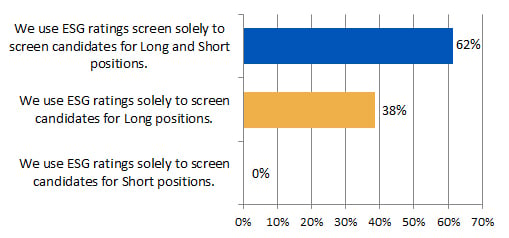
Of those employing ESG factors in their security selection process, a considerable majority – 61.5% — do so to screen candidates for both Long and Short positions. Slightly more than a third – 38.5% — do so solely to screen candidates for Long positions. No respondents reported using ESG factors solely to screen candidates for Short positions.
Q7: If you use ESG scores for selecting Short candidates, which ESG factors do you weigh most heavily?
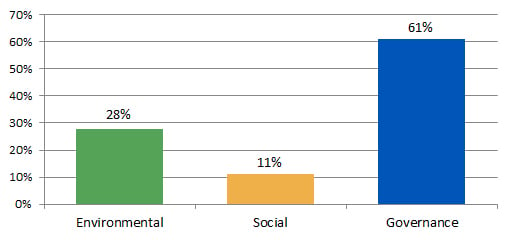
Governance is far and away the ESG factor weighed most heavily by investors considering Short candidates. Of those surveyed, 61.1% chose governance as the most significant ESG criteria in considering Short candidates, while 27.8% said they weigh environmental factors most heavily and 11.1% said sustainability was their top consideration.
This is another finding that probably shouldn’t be surprising given the positive correlation studies have shown between governance and company performance.
Q8: If you use ESG scores for selecting Long candidates, which ESG factor do you weigh most heavily?
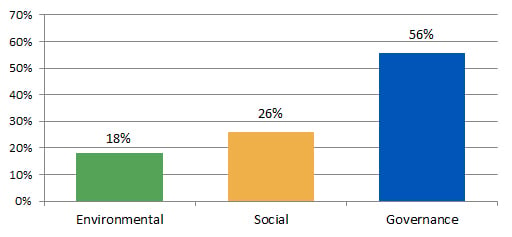
While the emphasis remains on governance for most investors viewing Long candidates through an ESG lens, the percentage is slightly less than for Short candidates at 55.6%. The emphasis on environmental factors also is somewhat less in considering Long candidates at 18.5%. The difference is in the consideration of social sustainability factors, 25.8% for Long candidates.
The larger emphasis on the “S” in ESG for Long candidates may well reflect growing investor recognition of the value of intangible assets like brand or customer loyalty – and how easily the value of those assets can be eroded through reputation-damaging human capital or supply chain events or other negative social factors.
Q9: Several firms publish ESG ratings/scores. Which publisher is your preferred provider?
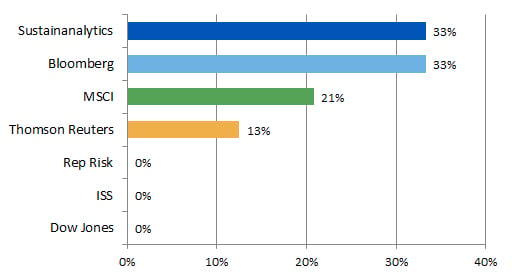
Survey respondents indicated a preference for four sources of ESG ratings and scores. Bloomberg and Sustainanalytics led the way, each favored by one-third of those surveyed. MSCI was selected by 20.8% of those surveyed and Thomson Reuters by 12.5%.
While the concept of “socially responsible investment” has a longer history, the introduction of considering more specific environmental, social and governance factors in investment decisions dates to the early 2000s.
Of those considering ESG factors in equity investment decisions, on average 52% of assets are currently allocated based on ESG ratings. Among those surveyed, 41% of respondents indicated that ESG ratings factored into 100% of their asset allocations.
While several of those who indicated ESG ratings factored in 100% of their allocations are also among those who’ve been considering ESG factors the longest, there were some investors who’ve considered ESG ratings only recently. Clearly, they’ve decided to go all-in with their ESG-based investment strategies from the start.
Note: The Barclay Hedge Fund Manager/Investor Survey went out to hedge fund professionals between June 24 and July 11, 2019. We received 70 responses from people working in hedge funds and commodity trading adviser (CTA) funds.


